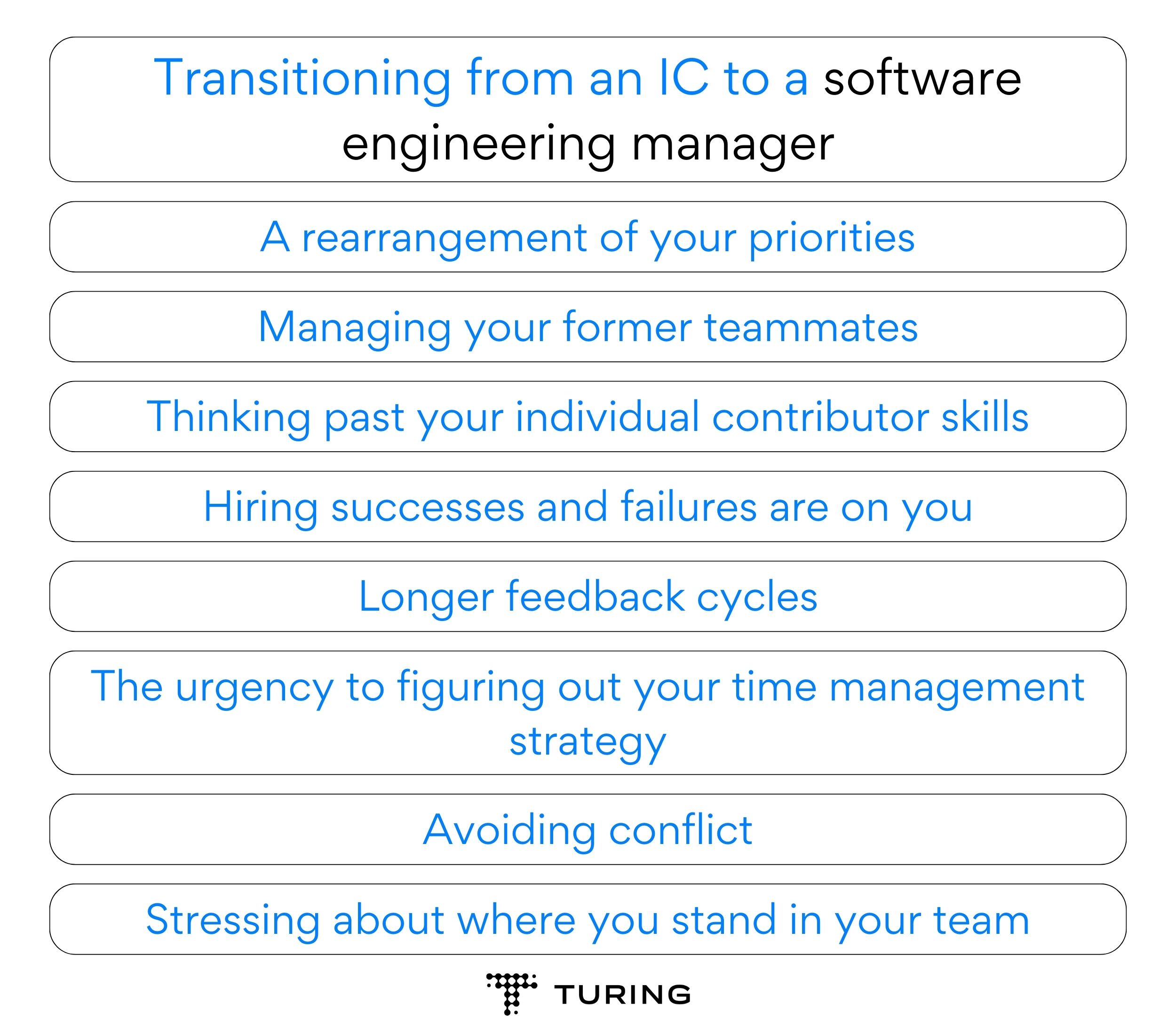Things to Expect When Transitioning from an Individual Contributor to a Software Engineering Manager?
Many developers aiming to move up in their professional ladder, spend hours asking themselves, “How do I switch to a software engineering manager?” While there’s no hard and fast process for this, there are certain changes every engineer or developer faces when making this change.
As a developer, transitioning from an individual contributor to a manager can be exciting, but also, challenging. You may be well-versed in testing, coding, and debugging, but managing a team demands different skills, such as delegation, communication, and conflict resolution.
Hence, in this blog post, we will explore what you can expect in the first few months when transitioning from an individual contributor role to an engineering manager. Let’s dive right in.
Table of ContentsTransitioning from an IC to a software engineering manager – 8 things to prepare for |
Transitioning from an IC to a software engineering manager – 8 things to prepare for

Transitioning from an IC to a software engineering manager
Let’s look at the things you need to keep in mind one by one.
-
A rearrangement of your priorities
The individual contributor meaning usually revolves around writing clean code, ensuring your assigned tasks are done on time, and teaching engineering best practices to your teammates. Hence, you will usually have a solid grasp of your priorities as an engineer.
However, when you prepare for a managerial role, one of the first things you will wonder is what the role entails. Will you be a tech lead who will also conduct performance reviews and one-on-ones? Will you still be coding? Will you be expected to mentor or coach your team members?
These questions and their answers will vary depending on where you work. But your priorities as an employee will definitely change. You will have to put your company first, your team second, and team members third. And if we may add, yourself forth. This is one of the critical things that will help you become an effective software engineering manager.
As a developer or engineer, your priorities would naturally be the other way around. Now, this doesn’t necessarily mean you would not think about what’s best for the company, but you’d be prioritizing your tasks first, automatically assuming that getting them done would be good for business.
However, the things you must focus on as an engineering manager are knowing how the company performs and increasing its efficiency. This is why it’s important to keep the priority order in mind, as mixing it up can land you with a splendid team that isn’t working towards moving the needle or with one where skilled individuals are going off their own ways, not producing enough value as a whole. -
Managing your former teammates
A core part of a software engineering manager’s job description is managing a team of engineers. More often than not, when you move into such a role within your organization, chances are you will lead and manage team members who were previously your peers. Some of them may even be your friends and have a similar technical experience as you.
This may come off as a weird dynamic, which it naturally is. As a manager, you now influence who your ‘ex-peers’ work with, what they work on, their promotions, and much more.
So, how can you turn this awkward situation into one that helps you be a good software engineering manager? Start having one-on-ones where you’re vulnerable and transparent with your team members. Address the fact that it’s awkward how you once used to be fellow engineers on the same team, and now they report to you. See their responses, and this will quickly lead to meaningful conversations where the dynamic improves and helps you manage your team effectively. -
Thinking past your individual contributor skills
As you step into the shoes of a software engineering manager, you will quickly realize how the role requires you to see past your own skills. Software engineering manager jobs are more about establishing workflows and ensuring the team sticks to them, maintaining a healthy work environment, developing project plans, and even participating in software programming. Hence, you must have some empathy and trust as you let others take on roles you once did and ensure your team operates seamlessly.
Maybe you loved solving certain problems or working on coding all day. Now, you will have initiatives to drive, meetings to conduct, and various other tasks to have a proper overview of how your team is performing. This means you won’t have much time to sit and work on coding solutions. You will have to delegate work and allow other members to thrive.
Also, read: 7 Tips to Write an Effective Engineering Manager Resume -
Hiring successes and failures are on you
Transitioning from an individual contributor to a manager, one of the best things you will experience is building a team. You will have to undertake hiring decisions to build a high-performing team that aligns with the company’s goals. Once you know what the team needs, you can search for candidates with strong traits to balance the team’s weaknesses. As a software engineering manager, you can even be the one to establish diversity within your team, whether that’s in gender, culture, race, age, religion, sexual orientation, or more.
Also, read: Engineering Managers, This Is How You Can Judge the Diversity of Your Team
While all this is exciting, there’s a downside to hiring people as well. You will now be the adjudicator for hiring decisions, which is a massive responsibility. That’s because there are two sides to this coin: if you hire someone and they perform well, your job is well done. However, it can be difficult if a new hire doesn’t do so or if the team doesn’t accommodate them ideally. If that continues, you’ll eventually have to re-hire another candidate and go through the hiring process again.
There’s no way to determine if a candidate will be a 100 percent successful hire at your company. However, the key to being a great software engineering manager is to tip the scales in your favor by practicing effective tips when building your team. Here are some:
- Look for individual contributor skills, expertise, and experience that can fill the gaps in your current team.
- A team comprising all junior engineers or senior engineers can be counter-productive. Mix and match to include a good combination of team members from different levels that can help the team be more efficient.
- Don’t focus just on skills. Hiring brilliant engineers without gauging their soft skills can pose a major risk in your software engineering manager role. Hence, check if they’re team-oriented, good communicators, and have an inclusive mindset, as these are just as critical for a team’s success.
- Focus on intersectionality and diversity to build your team’s overall skillset as vastly as possible.
- Look for individual contributor skills, expertise, and experience that can fill the gaps in your current team.
-
Longer feedback cycles
As an individual contributor, you may have fallen in love with the magic of writing code and instantly seeing its results on a website being used by many people. This instant feedback cycle excites many engineers, and it’s often one of the reasons they enjoy coding. Once you become a software engineering manager, the absence of this instant feedback cycle is one of the first things you’ll notice as a leader. This is because management seldom yields instant results.
As a manager, you can advise your team members or implement new strategies that will eventually take weeks, or even months, to surface as fruitful or not. The feedback loop a manager experiences is much longer than the one you may have gotten used to in your individual contributor role.
As an engineer, you get feedback on your design documents, code, or how your projects have been going. As a software engineering manager, you will have none of this. There will often be ambiguity about your expectations in your role. But, handling this uncertainty and establishing long-term gains is what makes a leader a team can look up to.
Also Read: 6 Mistakes Hiring Managers Should Avoid Making -
The urgency to figuring out your time management strategy
When you become a software engineering manager, you’re likely to spend most of your time on these:
- Managing – conducting one-on-ones, team meetings, and mentoring team members
- Hiring – establishing interview best practices to hire the right people
- Monitoring – evaluating the team’s individual performance and overall delivery metrics
- Planning and communicating – being the point of contact for both senior managers and your team members, gathering resources, and jointly planning for long-term goals with other teams
- Developing – working on technical tasks, including writing code and conducting code reviews (this decreases the more senior managing role you occupy)
As you can see here, the software engineering manager’s roles and responsibilities involve far more tasks than what you may have undertaken as an individual contributor. Hence, when you move into a managerial role, you will quickly feel the need to figure out your time management strategy.
You will have more meetings than before. Most of the time, you will schedule many of those yourself – the vital ones being the team meetings, one-on-ones, and syncing with key stakeholders. Here, you will have to decide how to structure these and leave time for uninterrupted tasks. Since you’re the software engineering manager, you will also have to take into account how much these meetings obstruct your team’s time and minimize that.
Since there’s no cookie-cutter approach to this, the best way to set up a time management strategy is by noting how many meetings you are involved in (per day or week), how much time they take, and planning your tasks around them.
- Managing – conducting one-on-ones, team meetings, and mentoring team members
-
Avoiding conflict
As an individual contributor, there may have been times when you saw one of your colleagues not pulling their weight and wished you could fire them. However, once you become a software engineering manager, you will quickly realize that firing an employee is not easy. That’s because you will be the one to deliver the bad news.
Many first-time managers experience conflict avoidance when they first undertake the managerial role. It’s only natural if you feel the same, as you never had to have difficult conversations with your teammates as an individual contributor. However, having these conversations is a big part of being a software engineering manager. While such conversations may not occur regularly, they are vital. What you say during those conversations can have more impact than you know.
Moreover, not all these tough conversations revolve around work performance either. Some work environments may not be as peaceful as others, and you may find a team member having issues unrelated to work or being closed off as they’re unhappy with you or someone else on the team. No matter what, getting used to having such conversations and not avoiding conflict is key when transitioning from individual contributor to manager.
Also, read: 6 Common Interview Mistakes Remote Developers Make -
Stressing about where you stand in your team
Lastly, when you become a software engineering manager, one of the hardest (and sadly, most common) things you will experience is worrying about where you stand in your team. Once you get into your managerial role, there will be an invisible divide between your team and you, irrespective of how deeply involved you were with the team as an individual contributor. But you must remember that although this is an unpleasant feeling, it’s completely natural.
You may want to maintain the same relationship with your team members that you had before. However, there will be times when you will have to criticize their work, deliver strong feedback, settle disputes between members, or even handle HR situations.
While you may be worrying about this new divide between you and your ex-peers, don’t forget that you’ll have new peers as a manager – the other engineering managers in your company. That’s why you must network with the other managers once you take up your managerial position. This will help you form invaluable relationships and allow other managers to be there for you, whether that’s to help you navigate new challenges or work on cross-team projects.
Apply for remote engineering jobs at Turing
Transitioning from individual contributor to manager, as important as it is, comes with its own set of challenges. A managerial role puts you deeper into the company’s bigger picture and hands you the responsibility of creating, managing, and mentoring teams for the company’s success.
Whether you’re considering a transition to a software engineering manager or you’re already one, this blog will provide you with key insights into what you can expect once you take up the role. Moreover, we hope the information shared here can help you prepare for the move and set yourself up for success.
If you’re actively searching for lucrative remote engineering jobs, visit Turing. We provide AI-matched, high-paying engineering opportunities where you can work with top U.S. clients from anywhere in the world. Sign up today.
Join a network of the world's best developers and get long-term remote software jobs with better compensation and career growth.












